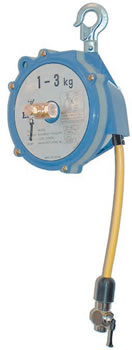Back to Product Category
ST
SERIES TWIN-HOSE BALANCER
|
|
 |
|
 |
|
|
|
|
|
|
The
ST-30 Air Tool Balancer is to be used with feed-back air tools. The air
is supplied through the outer hose to the
tool, the inner hose provides the controller with the feedback signal. |
|
|
|
|
|
|
|
•
Unique solution for feed-back tools.
• Easy and reliable operation.
• Eliminates problems with coiled hose.
• Exclusive 18 month warranty |
|
|
|
|
|
|
|
Main
air inlet: R 3/8" NPT with 3/8" hose barb
Main air outlet: R 1/4" with adaptor for 1/4" FPT
Signal Air inlet and Outlet: Quick release coupling for 4 mm OD hose. |
|
|
|
|
 |
|
Order
Online, by Phone, or by E-Mail |
|
|
|
~ Add
items to your online shopping cart ~
Click the Model No. of the item you wish
to purchase. |
|
|
PRICE |
| Model No. |
Capacity
Range (lb) |
Hose
Travel (ft) |
Outer
Hose ID |
Inner
Hose ID |
Wt (lb) |
PRICES |
| ST-30 |
2.2 to 6.6 |
4.27 |
3/8" |
1/8" |
6.2 |
$1,284 |
|
|
Features
and Benefits |
|
Advantages
of Using an ENDO Spring Balancer: |
ENDO
Spring Balancers are a valuable addition to your
assembly line. They support heavy tools with cable tension
equal to the weight of the suspended tools, which makes
them seem virtually "weightless". As the tool is reposi-
tioned the balancer extends or retracts the support cable
to follow the tool's movements. Constant tension on the
cable is accomplished with a spring motor and a tapered
drum. The assembler has the flexibility to reposition the
tool, while experiencing comfortable operation and less
fatigue. Similar to a Balancer is the Retractor, which does
not have a tapered drum. The tension on the cable
increases as the cable is extended |
• Suspend
tools in assembly lines or other work areas
• Help the assembler with repetitive tasks such as
installing fasteners: screws, nuts, bolts, etc.
• Hold fixtures, tools, welding guns, and similar
equipment
• Improves efficiency and diminishes worker fatigue
• Stabilizes tool positioning and contributes to work
accuracy
• Contributes to a safer working environment
• Keeps fixtures, tools, and welding guns off of the floor
and clean.
• Eliminates the need to separately power the balancer |
|
|
|
Application
Guidelines |
•
Size the balancer to carry the total weight to be balanced - tool plus all
accessories - and stroke (maximum to
minimum height) required.
• Size to the upper end of the capacity range of the balancer when
possible.
• Always attach secondary support cable(s) to the eyelet provided for
additional safety.
• Balancers are normally hung vertically and the rope is pulled out
vertically. To prevent the rope from wearing on the
guide, the rope should not be pulled out at an angle to the
balancer body. The balancer can also be mounted
horizontally, however a pulley system must be employed to guide
the rope straight out of the balancer then down to
the tool. Again, care must be taken to prevent the rope from
wearing on the guide. A trolley and rail system can be
used to help the balancer adjust to changing angles.
• If multiple balancers are used in close together, install them at
staggered heights to keep them from hitting each other
• The spring tension is factory preset to the mid-range of the rated
capacity. To adjust the tension turn the worm gear
or spindle clockwise to increase the tension and counterclockwise
to decrease the tension. |
|
|
Twin Hose Balancer, Dual
Hose Balancer, Air Tool Balancer, Air Balancer, Twin Hose Pneumatic Balancer,
Dual
Hose Pneumatic Balancer, Dual Hose Tool Balancer, Tool Positioner, and
Pneumatic Balancer from your source for
material handling equipment. |
Back to Product Category
|



